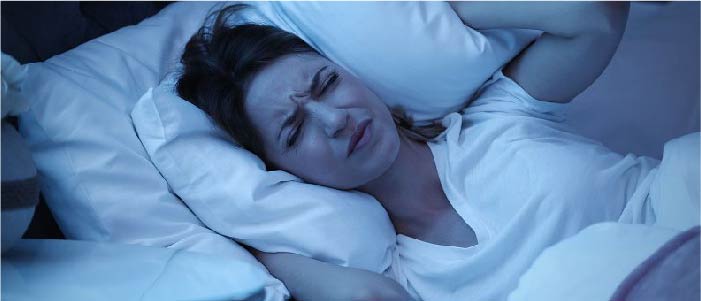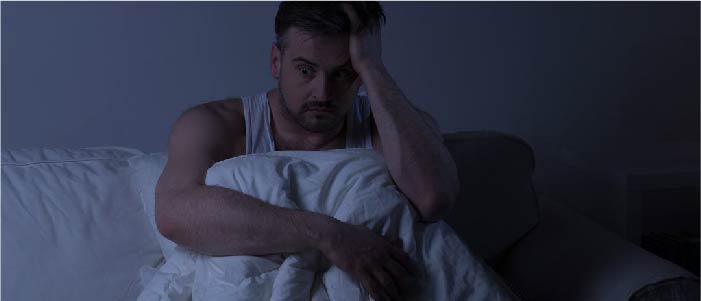Blog > Can Sleep Apnea Cause Nightmares? [OSA & Bad Dreams 2024]
Blog > Can Sleep Apnea Cause Nightmares? [OSA & Bad Dreams 2024]
Yes, sleep apnea can cause nightmares. The common sleep disorder affects over 37 million adults in the United States and many can attest to the disorder causing nightmares. Nightmares are common and aren’t always related to sleep apnea—everyday stresses can lead to nightmares and anxiety dreams. But, if you’ve been experiencing more nightmares and vivid dreams, it’s possible you might have sleep apnea. Keep reading to learn more about the connection between sleep apnea and nightmares and what you can do to get help.

We’ve all had the occasional nightmare. However, there are some things that can cause recurring nightmares. These dreams can be distressing to people and can lead to poor sleep quality, which can lead to ill health effects. The causes of nightmares vary depending on circumstances. Some people have nightmares because of medications, alcohol, drugs, lack of sleep, illness, or anxiety. In many circumstances, it’s possible nightmares are linked to emotional and psychological stresses at home, work, or school, trauma, or stress.
While it’s not possible to control your dreams, here are some things you can do to help eliminate nightmares.
Go to bed and wake up at the same time every day and make sure to get enough sleep at night to prevent you from napping during the day. Getting enough sleep will prevent excessive use of caffeine, alcohol, cigarettes, or other substances during the day which will help sleep.

Exercising on a regular basis is one of the best things you can do to improve your sleep. Avoid exercising too close to bedtime. A higher heart rate and adrenaline from exercise can interfere with sleep.

A part of creating a bedtime routine is relaxing before bed. Try taking a warm bath, reading a book, or meditating before bed. This will help you unwind before bed. Avoid using your phone, computer, or watching T.V. before bed as the blue light from disrupt melatonin production and delay sleep.

In addition to mental health issues, frequent nightmares can be a sign of parasomnia, or abnormal behaviors during sleep. Parasomnias can end up causing serious problems when you’re both awake and asleep. Common examples of parasomnia include: sleepwalking, night terrors, hypersomnia, and Delayed Sleep Phase Disorder (DSPD).
Remember, if you are experiencing anxiety, depression, or other mental health issues in addition to nightmares, see a doctor. It’s likely that nightmares are caused by mental distress and figuring out what is causing the nightmares can stop them.
While a nightmare is a bad dream, a bad dream is not necessarily a nightmare. In the science of sleep medicine, nightmares are vivid dreams that cause you to wake up, bad dreams do not. Nightmares are often frightening, disturbing, strange, or otherwise distressing. They are most likely to occur during rapid eye movement (REM) sleep, which is the stage of sleep most connected to dreaming. Nightmares are more common in the second half of the night, when you spend more time in REM sleep. Physical symptoms such as increased heart rate or sweating are common when waking from a nightmare.
One of the most common warning signs of sleep apnea is constant and loud snoring. Sleep apnea is a breathing disorder that is potentially fatal in which breathing stops and restarts regularly throughout the night, which causes snoring. Along with snoring, another common sign of sleep apnea is poor sleep quality and waking up feeling fatigued even after a full night’s sleep.

There are three types of sleep apnea: obstructive, central, and complex.
Sometimes, it's difficult to distinguish between the symptoms of obstructive and central sleep apneas as symptoms overlap. Obstructive and central sleep apnea symptoms most commonly include:
There is a clear connection between sleep apnea and nightmares. So, yes, sleep apnea can cause nightmares. Even though studies show a connection to sleep apnea and nightmares, many sleep apnea sufferers don’t remember their dreams or don’t dream at all because they never reach REM sleep where dreaming occurs.

If you do suffer from nightmares caused by sleep apnea, they often involve drowning and suffocation. This is most likely due to the suffocating feeling caused by disrupting breathing. The root cause of sleep apnea-induced nightmares is a lack of oxygen. When the body is denied oxygen, it goes into a state of stress, which presents as nightmares.
While sleep apnea can cause a host of health problems that can destroy your health and quality of life, the nightmares from the condition itself. The memory of a nightmare and feelings of anxiety associated with it can impact your waking hours and lead to depression.
Sleep terrors or night terrors and nightmares are often confused. Both cause someone to become disturbed and fearful during sleep, but there are several characteristics that differentiate nightmares from sleep terrors.
Sleep apnea can cause night terrors in some circumstances. Night terrors occur most commonly in children but adults can experience them as well. Lack of oxygen from sleep apnea causes stress in the body, which, in turn, leads to your body reacting to that stress via night terrors.
Studies have shown that low oxygen caused by obstructive sleep apnea (the most common form of sleep apnea, which occurs when the airway is physically blocked) can lead to nightmares. Similar to lack of oxygen and night terrors, a lack of oxygen can also cause nightmares. The nightmares are a manifestation of the stress in the body from the lack of oxygen. Those who suffer from sleep apnea are much more likely to suffer from nightmares than those who do not. The nightmares usually involve the feeling of suffocation.
Sleep apnea is linked to night sweats. Although not all night sweats are associated with sleep apnea. Night sweats are often caused by sleeping in a room that is too hot, wearing too many clothes to bed, or using too many blankets. On the other hand, night sweats can be a sign of a health condition like sleep apnea, or in women, a hormonal imbalance. When you stop breathing due to sleep apnea, the levels of cortisol increase in your body which causes sweating.
Sleep apnea patients dream just like those who do not suffer from the condition. Those with sleep apnea experience more nightmares and can recall more dreams with negative emotions. However, studies show that sleep apnea patients experience less nightmare recall than others. Sleep apnea sufferers experience more vivid and emotionally distressing dreams.
Sleep apnea dreams are not only more vivid than normal, but they also become more unpleasant, frequent, and intense as the illness progresses. Like the cause of nightmares and sleep terrors, these dreams are a manifestation of stress caused by lack of oxygen and increased cortisol levels. As the oxygen is cut off, that feeling is translated into dreams which is why many who suffer from sleep apnea experience dreams of drowning, suffocation, strangulation, and other sensations.
Sleep apnea is a serious health problem that can have potentially deadly effects like heart attacks, strokes, diabetes, and more. That, coupled with frequent nightmares and poor sleep, can destroy your health. If you think you might have sleep apnea based on your symptoms, make an appointment with your doctor and schedule a sleep study. If you’re looking for a new mattress or more sleep advice, make sure to read our blog.

 Showrooms
Showrooms
Meet The Author:
Shanir Kol
Shanir Kol, founder and CEO of SleePare, pioneered the “Try and Buy” model in eCommerce, enhancing mattress shopping by combining in-store trials with online purchases. Launching in 1999, his company focuses on customer satisfaction and eco-friendly practices, aiming to minimize mattress waste and expand sustainably.